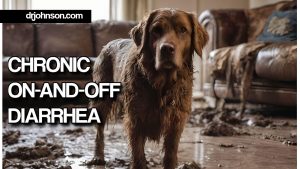Fwd: Chronic diarrhea considerations pretty thorough

An “on-and-off diarrhea with the following hallmarks:
- “Seems to be fine when on medicine but as soon as the dog goes off, it’s back.”
- “If we give anything out of the ordinary it triggers diarrhea.”
- “She never had this before <insert date>”
- Mostly diarrhea rather than vomiting.
- The dogs act fine when they go through the spells of diarrhea.
- Only occasionally vomiting.
Various Causes and Contributors to be Ruled out:
- Giardia tops the list (A fecal exam and some Metronidazole are effective but shows up on fecals less-than-half of the time)
- Hookworms in very young or rather old dogs (Empirical deworming, a fecal exam, or being on Heartgard are effective)
- Coccidia in younger dogs under 2 years old (Albon / Sulfa are effective and fecal exams may reveal it. Often not though.)
- Inflammatory Bowel Disease can be temporry or permaanent. (Sulfasalazine therapy can aid the diagnosis)
- Cancer is possible but in most cases is quite unlikely. In desperation, endoscopy, radiology, CT scan, MRI and maybe piunch-biopsy are useful but extremely expensive diagnostics for hopeless outcomes. So, why?
Various Controls for Active Diarrhea:
Phenobarbital can slow the gut and can save lives if the diarrhea is peeling through a dog’s hydration badly. This would be used for watery diarrhea of more than 24 hours duration and not responding to other modalities.
Sulfasalazine can be tried and the “results” should be closely noted, even written down. There is no reason to try Sulfasalazine if you don’t gather the information about “how she did on it” during the administration.
Steroids (to illuminate IBD) are risky in diarrhea – however, can be effective in gastritis and inflammatory colitis. In my hands, sulfasalazine needs to be shown to help, before daring to use a steroid in a bowel case.
For “watery” diarrhea:
DMSO can be given under the skin (properly diluted) if the diarrhea has gone to soup, water, jelly and absolutely has to be curbed pronto. DMSO dilutions IV or SC are great in long term diarrhea where nothing has worked so far. DMSO given undiluted under the skin feels like a Murder Hornet and a Killer Bee had a baby and four of those stung you. So DON’T use it undiluted.
Tums tablets have the effect of forming up (drying out) stools and reducing excess stomach acid which can be a contributor to colitis. So Tums would be 1-2 tablets (berry flavored) per twenty pounds once or twice a day. It’s indisputably helpful and cured nobody’s dog.
Digestive Enzymes such as “Prozyme” are sometimes amazingly helpful. Sometimes dogs never had enough enzymes. And sometimes later in life their enzyme production declines. Without “enough enzymes” the dog digests food poorly and then “whole undigested proteins” make it to the colon and create and inflammatory response. Also known as Inflammatory Bowel Disease” which is (amazingly) controlled with Prozyme!
There is an age and condition where pancreatitis should be ruled out.
All cases demand ‘stringent’ attention to MONOTONY in the diet. The food, should be Dry. The treats, NONE or we pre-agree on what they are. And what the treats aren’t. These dogs should never be “encouraged” to eat because they can feel diarrhea coming on in advance, and won’t be hungry the day before that happens. Let it be.
Of ALL the things the owner should remember: 99% of these type cases are very sensitive to fat. Any little burst or bite of fat in the diet can trigger explosive results.

